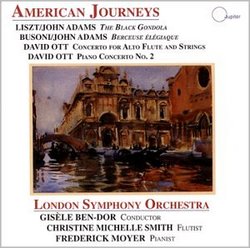The Adams is great, and Ott is a terrific find.
Bob Zeidler | Charlton, MA United States | 05/02/2003
(5 out of 5 stars)
"This is an unusual and really intriguing release. Considering that the works here were recorded seven years ago, and the CD released some five years ago, I am hard-pressed to explain why I've been unsuccessful in finding any previous mention of it, either in print or on the web.
John Adams, for those having a predisposed "take" on him, is more than "mere minimalist." Although he tends to get lumped in with Philip Glass and Steve Reich as one of "the big three of the Second-Wave American Minimalist Movement," he has moved well past this limitation in works too numerous to mention. But he is also an orchestrator of no mean ability, having orchestrated, in addition to the two works in this album, a number of songs by Charles Ives. (Five of these orchestrated Ives songs can be found on an equally remarkable album titled "John Adams: American Elegies," available elsewhere at Amazon.com; highly recommended.)
There is certainly nothing "minimalist" about Adams's orchestrations of the Liszt and Busoni pieces (the Liszt a late piano work, the Busoni a work for full, rather than chamber, orchestra). Both are of late Romantic "Gothic" style, rather reminiscent, in mood, of Rachmaninoff's "Isle of the Dead" symphonic poem, particularly the Liszt, with its musical depiction of waves lapping against the gondola. Despite the chamber orchestra settings, both pieces are satisfactorily rich-sounding, and elegiac, rather than purely gloomy, in mood. Exquisitely performed here by the London Symphony Orchestra conducted by Gisèle Ben-Dor, these must be a good match to Adams's own performances, available on a different CD (along with his "El Dorado"), which I have yet to hear.
Anyone wondering "What ever happened to those great, brilliant Romantic-era piano concertos?" (last seen, in mild disguise, in the piano concertos of Serge Prokofiev, and a few to follow later, such as Samuel Barber's) need look no further than the Piano Concerto No. 2 by David Ott. This work has to be one of my "finds of the year" in that I've somehow managed to totally miss Ott's works (and the fact, as noted at the top, that there seems to be little if any publicity regarding this album certainly doesn't help). Born in the same year (1947) as Adams (apparently the single common factor between the two composers), Ott - based on the two works on this CD - works in a very tonal post-modernist neo-Romantic idiom.
Written in 1994, for a commission by Frederick Moyer, the soloist in this performance, the work is a big, brilliantly splashy concerto "in the old style" suggestive of some of the great showpieces of Rachmaninoff, Prokofiev and others without being purely derivative. I've got more of this post-modern neo-Romantic music in my library than I care to admit, because so much of it is forgettable. But not this Ott work. Sure, it's a throwback in some respects. But it is written with craft, and sounds so well, and shows off the soloist so well, that I've got it figured as eventually being a repertoire piece; I just can't see how it could lose. Unlike other, lesser works in this post-modernist neo-Romantic style that languish in my library because they wore out their welcome on the very first listen, this work is eminently relistenable; a real gem, and, I'm sure, a real crowd-pleaser in the concert hall. Moyer plays this piece for all it's worth (which is quite a bit); his technique is nothing short of prodigious.
Ott's other concerto, for alto flute and strings, is equally attractive. The smaller-scale scoring means that the soloist, with a mellower instrument not having the penetrating power of the conventional soprano flute, doesn't have to "do battle" with orchestral forces that could easily swamp the instrument. But, mellower or softer or not, the alto flute has every bit of the agility that the standard instrument does, and Ott's writing brings this agility - as well as other tricks well-known to flautists - to the forefront. As in the piano concerto, the soloist - Christine Michelle Smith - is closely tied to the work, being its dedicatee.
Gisèle Ben-Dor, an excellent conductor from Argentina by way of Israel and presently the music director of the Santa Barbara Symphony Orchestra, has already begun to make a name for herself in the Latin American repertoire of the 20th century (Ginastera, Revueltas, Villa-Lobos). Here, leading the London Symphony Orchestra in these American works, she is superb, turning in thoroughly idiomatic - and brilliant - performances. And the recorded sound is nothing short of splendid.
The album title is almost too cryptic - and hardly original enough - for the treasures it contains. This is particularly the case for the two David Ott concerted works, which deserve "repertoire" status; the Adams transcriptions are, as I previously noted, available elsewhere, conducted by Adams himself.
Bob Zeidler"


 Track Listings (4) - Disc #1
Track Listings (4) - Disc #1